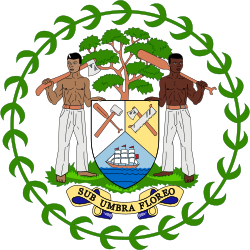28 April 1954 | ||||||||||||||||||||||||||||
All 9 seats in the Legislative Assembly | ||||||||||||||||||||||||||||
|---|---|---|---|---|---|---|---|---|---|---|---|---|---|---|---|---|---|---|---|---|---|---|---|---|---|---|---|---|
| Turnout | 70.41% | |||||||||||||||||||||||||||
| ||||||||||||||||||||||||||||
| ||||||||||||||||||||||||||||
 |
|---|
General elections were held in British Honduras on 28 April 1954, the first held under universal suffrage. [1] The new constitution replaced the Legislative Council with a Legislative Assembly, which had nine elected members, three officials and three appointed members. [1] The result was a decisive victory for the pro-independence People's United Party, which won eight of the nine seats in a coalition with the General Workers' Union.
Contents
The pro-colonial National Party won the remaining seat, with NP candidate Charles Westby prevailing in the Toledo constituency. [2]